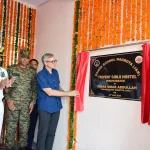Dr.ADIL RASOOL MALIK
Introduction
The annual Shri AmarnathJi Yatra is one of the most revered Hindu pilgrimages in India, attracting millions of devotees from all across the globe who embark on a challenging journey to seek the divine blessings of Lord Shiva. Nestled in the breathtakingly beautiful Himalayan region, the Amarnath cave shrine is situated at an altitude of approximately 3,888 meters (12,756 feet) making it a challenging journey which is often concomitantly associated with a range of high-altitude health complications for the pilgrims. To ensure the well-being of the yatris (pilgrims), the health department has undertaken elaborate preparations, equipped themselves with the latest medical facilities and well-trained staff capable of handling all exigencies.
Understanding the High-Altitude Complications
Embarking on the Shri AmarnathJi Yatra is not just a spiritual experience but also a physical and mental challenge due to the extreme altitude. The human body undergoes several physiological changes during the onward journey as it adapts to the thinning air, lower oxygen levels, and increased exposure to ultraviolet radiation. These factors can lead to various health complications, including acute mountain sickness (AMS), high-altitude pulmonary edema (HAPE), and high-altitude cerebral edema (HACE). Recognizing these risks, the health department has taken proactive measures to address these potential medical emergencies amidst various others.
Equipping Medical Facilities
The health department has left no stone unturned in preparing robust medical infrastructure along the yatra route. Temporary medical camps equipped with the latest medical equipment and facilities have been set up at strategic locations to cater to the needs of the pilgrims. These camps are equipped with emergency medications, oxygen cylinders, defibrillators, stretchers, and other essential equipment to handle a wide range of medical emergencies. Additionally, advanced medical facilities, such as portable X-ray machines and ultrasound scanners, have also been made available to diagnose critical conditions promptly.
Trained Medical Staff
Recognizing the paramount importance of skilled medical personnel in handling high-altitude health complications, the health department has been conducting specialized training programs for doctors, nurses, and paramedical staff. These training sessions arefocussed on educating the medical personnel about the unique challenges of high-altitude environments, recognizing early symptoms of altitude sickness, administering emergency treatments, and providing effective care to yatris. The health department has also collaborated with mountaineering experts and medical professionals experienced in high-altitude medicine to ensure the medical staff is well-prepared.
Health Monitoring and Awareness
To ensure the well-being of the pilgrims, the health department has prepared to implement a robust health monitoring system which includes mandatory medical check-ups for yatris at the base camps before starting the yatra. These check-ups will include vital parameters assessment, oxygen saturation levels, and general physical examination. The health department is also planning to organize awareness campaigns to educate yatris about the symptoms of altitude sickness and the importance of acclimatization. Information booklets and pamphlets are to be distributed, and audio-visual presentations shall be conducted to disseminate crucial health-related information.
Collaboration and Emergency Response
The health department is working closely with other key stakeholders involved in the yatra, such as the local administration, disaster management teams, and security forces. This collaboration shall ensure a well-coordinated emergency response system in case of any medical contingencies. Helicopters equipped with medical facilities are available for air evacuation of critically ill yatris to nearby hospitals. Moreover, the health department maintains constant communication with medical centers along the yatra route, ensuring seamless coordination and quick access to additional medical resources, if required.
The Shri AmarnathJi Yatra 2023 promises to be a spiritually enriching experience for millions of devotees. The health department’s preparedness to handle high-altitude health complications demonstrates their commitment to ensuring a safe and smooth pilgrimage. Equipped with state-of-the-art medical facilities and a well-trained medical staff, the health department is ready to address any medical emergencies that may arise during the yatra. With their vigilant monitoring, comprehensive medical infrastructure, and collaborative approach, pilgrims can embark on their spiritual journey with confidence, knowing that their health and well-being are in capable hands.
(The Author is a medical doctor and is very active in positive perception management of various political and social issues. He can be reached at: [email protected] & twitter @drmalikadil)





